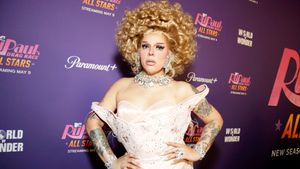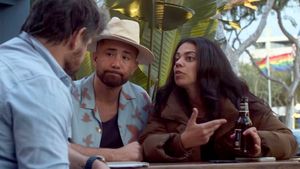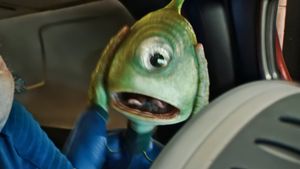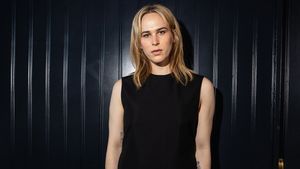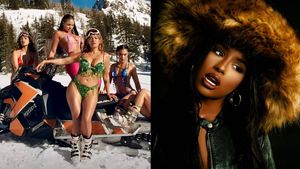Season 2 of The Last of Us has been a ride — intense, emotional, and already polarizing. Fans are still reeling from the early loss of Joel Miller (Pedro Pascal), and now, just a few episodes in, the show is doubling down on the emotional stakes. Last night’s episode, directed by Kate Herron, was a turning point — and not just for the story, but for the characters at the heart of it.
Episode 4 puts Ellie (Bella Ramsey), Dina (Isabela Merced), and Isaac Dixon (Jeffrey Wright) to the test — each of them forced to confront a choice that could reshape everything. And just when emotions couldn’t run any higher, a major reveal dropped: Dina is pregnant with her ex Jesse’s baby. The moment cracked something open — personally, relationally, narratively — and it’s the kind of storytelling that lingers.
Out spoke with Herron — a bisexual creative who previously helmed the first season of Loki— about her approach to directing such a pivotal chapter about queer love — how she brought intimacy and intensity to the scenes between Ellie and Dina, why this episode matters in the arc of the season, and how it all lands at a time when queer family structures and LGBTQ+ rights are being threatened under the current political climate.
Episode 4 opens with the idea of choices — Isaac forcing his soldier to pick a side sets the tone for the entire episode. How did you approach visually and emotionally capturing the weight of choice, not just as a plot device, but as a reflection of survival, loyalty, and identity in a collapsing world?
Kate Herron: Oh, wow, what a question. I think in terms of the opening at least and across the whole episode, for me, I'm just always very emotionally led into what makes it feel real and grounded. In the opening scene, you have this very young guy who's deciding, what am I going to do in this terrible situation? It was very important to me to introduce Isaac in an exciting way. You don't immediately see him and then we reveal him just because obviously, you know, it's Jeffrey Wright. I agree with you – there is a sense of choice going across the episode, whether it's in that situation or in the romantic situation with Ellie and Dina and Dina deciding, oh, actually, how do I feel about this situation and dealing with that kind of conflict within her. I think for me, it was just always tracking the emotional arcs. I'm always just working out how to emotionally ground us and also picking who is taking us along the story at this point and putting us as much into their shoes as possible. That's always what's key for me.
Was there a conversation as to why Isaac was an important key element to move this theme along as we get into Dina and Ellie?
I wouldn't be able to answer that question because I would say it would be Craig Mazin, the writer on the series, because Isaac was always in my episode and I always knew I was going to introduce Isaac. I think for me, it was more the conversations I had with Craig about this idea of cycles of violence. You see where Isaac was before, and then we join him much, much later in his story in my episode. That does echo out across the entire series. I think for me, it was more important in showing where our characters are in this episode as they're entering this terrible journey they're going on. To this point, people are scary, but you have the infected. It was really important in this episode to show that actually, in Seattle, not everything is not what you think it is. People are just as dangerous, if not more dangerous than the infected to you. That was really key to setting up here. We don't completely understand what is happening here, but you know, it's going to make their journey so much harder.
 Jeffrey Wright in The Last of Us.Courtesy HBO
Jeffrey Wright in The Last of Us.Courtesy HBO
You’ve always found ways to tell queer love stories within genre spaces — from Doctor Who to now The Last of Us. What do you feel genre allows you to say about love and grief that perhaps realism cannot?
I'm very nerdy and so I think part of it, I think you can do it without fantasy or genre elements. But for me, like those are the genres that I love. I think for me, the most effective fantasy stories or sci-fi or horror are when I can completely relate to the people in the story emotionally. I might not be able to relate to the circumstances they're in because, you know, it's so different from my world. What made me so excited with the script for episode 4 that Craig had written was I was like, Oh my God, this is such a relatable love story.
In Episode 4, there’s a breathtaking moment where Ellie plays “Take On Me” on the guitar — and through that performance, you allow Ellie and Dina’s deeper connection to unfold with such tenderness and vulnerability. As a director, how did you approach capturing that shift — not just as a performance, but as a pivotal emotional unmasking between two characters who are learning to trust and love in a broken world?
I think just even on a personal level, sort of like a human level, no matter what fantasy world or era of time you're in, like that is very relatable. Like I'm going to play a song for my crush. It's like a heart on Ellie's sleeve type of moment. At the same time we got lots of different levels of reaction. I remember talking to [Bella Ramsey] and they agreed to do one take where Ellie just doesn't even look at Dina, like Ellie is just too shy to do it. We don't end up using that obviously for the whole take. When you're directing and you're collaborating with the actors, that's what's really key, especially with film. With film, you have this time to film it. We know the overall emotional goal here, like you said, is to see Dina and Ellie's connection to each other. But then within that you can find nuance and be like, ok, well let's see if you're just really shy here or one where you're just a bit more confident. I think for us, it was always about building up on this awesome skill that Ellie has, which Joel taught Ellie, which is so nice, you know what I mean? Showing that this is something that Ellie can do really well and that's very moving. Just these two characters, everything that's happened before to them in the first three episodes is harrowing and everything they've been through. It’s this little moment where you can't help but connect it to Joel in some ways, just in terms of being with the guitar. The other key thing with it is that it's a moment of just relief in a very harrowing world. The Last of Us world is very harrowing. It's very violent and you don't get many moments, even just them finding a music shop where there's no infected. It’s like we just get to be normal people just for this little moment in time, which I think is very beautiful.
 Ellie plays a moving song in The Last of Us.Courtesy HBO
Ellie plays a moving song in The Last of Us.Courtesy HBO
After Dina discovers Ellie’s bite, trust becomes an unspoken but essential thread between them — a fragile, dangerous kind of faith in each other. As a director, how did you approach building that quiet tension and vulnerability on screen, and what did trust mean to you in shaping their evolving bond in this world?
It was really key that they come out of this high adrenaline run through the subway. For me, it was about the audience being like, Oh no, we thought these two characters might get together, but now there's this secret and obviously Dina has her own secret, like with the pregnancy. I think for me it was like these two characters obviously needed to have a conversation, but I wanted to keep that adrenaline up. Since it's The Last of Us, often characters don't get to experience joy or don't get sort of a happy moment in terms of like a love story. I think for me, it was really important to earn the kiss that you do feel that Ellie's in serious danger. It was really important to keep that tension just ramped up right up to the moment they kissed because the kiss in the first episode is so beautiful and so moving. I think what's so nice in this episode is that we don't really give you a chance to catch your breath. It was just making sure that it felt earned. Obviously I was happy as I got to direct it, but also because I think with television you want that quiet ramp up and you want to build that tension.
There’s a haunting beauty in watching Ellie and Dina speak about their future together — dreaming of something whole in a world that's broken. How did you, as a director, frame those moments of hope without losing sight of the grief and devastation surrounding them? And how do you view hope as a storytelling tool in apocalyptic narratives?
There's always hope and I'm always going to try and find hope in places. I think The Last of Us is a very harrowing world and often characters don't get to experience hope, or if they do, it's not long-lasting. For me, a really good way to summarize it is: Seattle, for example, when they first arrive, you know, they're looking around all the remnants of this amazing city and they talk about the rainbow flags and they have no context but what those would mean culturally to like us, the audience watching today. I love that there's this kind of lightness and how they're talking but, hey, round the corner, and there's all these skeletons everywhere and they're immediately reminded of this harrowing world they're living in. That’s always the fine tonal balance with this show – yes, we do have these moments of joy and happiness, but they're in this really tough world. It’s even more so moving that in spite of being in that world, they still are finding moments to find joy.
One of the most quietly groundbreaking moments is seeing Ellie not only accept Dina’s pregnancy, but tenderly offer herself as a “father” figure — a young queer woman embracing the idea of family in a way we so rarely see on screen. As a director, how intentional were you about framing that moment of openness and boundary-breaking love, especially within the harshness of their world? And how did you want the audience to feel witnessing that kind of emotional courage in a genre where survival often overshadows tenderness?
I loved how Craig wrote that scene and I just, look, it just makes me love Ellie so much because Dina's like, look, I'm in the situation. This is what's happening to me and Ellie’s all in. We're going to be a family. For me, it just shows how deep their love is between each other. I just wanted the audience to feel that they were just a quiet observer in that moment. It had to feel intimate and it had to feel tender because it's such a vulnerable conversation they have the morning after about everything. I hope people just felt moved by it. I know I was very moved reading it, and I was even more moved when I saw what the actors did with it.
 Ellie and Dina run from danger in The Last of Us.Courtesy HBO
Ellie and Dina run from danger in The Last of Us.Courtesy HBO
Ellie’s willingness to step into a role of parenthood — to love beyond blood, beyond tradition — feels especially radical today, when LGBTQ+ rights and queer family structures are increasingly under political threat. How did you think about portraying that moment of acceptance and chosen family on screen could serve as a quiet act of resistance? And how do you see storytelling like this helping to reframe what "family" can look like for a new generation of viewers?
It was just so important to me that it was just presented as a very grounded conversation that two people could have regardless of sexuality. I think that's the thing. I think if people watch it who aren't queer, they could be like, oh, actually I had this conversation, because there are lots of people who are parents where they have stepped into that role, sexuality aside. It’s about making those conversations feel grounded and relatable and being like, oh, actually we're not that different. It was a massive privilege to be able to direct that scene and know that it would be seen in a show like The Last of Us, which is a massive credit to [writers] Craig and Neil Druckmann, in wanting to tell that story. As a director, I was trying to just make it feel authentic and grounded and hopefully help people not feel as alone, honestly.
If you could imagine a future for Ellie and Dina beyond the violence and survival we’re used to — a version of their story where they get to simply exist — what kind of life would you dream for them? Not just as survivors, but as people in love?
I can't comment on any of the story stuff that's succumbed, but I would say in terms of like my hope, just from watching episode 4, is just that they are happy, and it sustains. For this brief moment in time, these two characters have this beautiful, truthful moment where, I mean, what's more joyful than realizing the person that you are in love with also loves you back? I would just always wish that happiness for them in whatever form that would be.
From Doctor Who to The Last of Us to your future project with The Sims, you’re moving between incredibly different worlds. What is something that remains constant for you as a director, no matter the setting and what’s the non-negotiable heartbeat of a Kate Herron story?
In a world that often drives us not to feel connected to one another, I’m very interested in empathy — and in using storytelling as a way to explore imperfect characters. I’m curious about how we emphasize with people we don’t always agree with, and how story can help us better understand the decisions that led them to where they are. And, of course, some fun jokes along the way.
The Last of Us streams Sundays on Max.







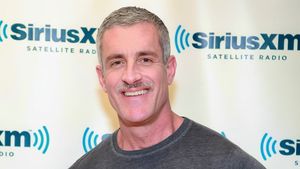




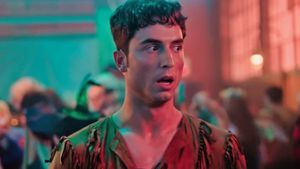








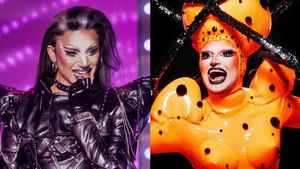



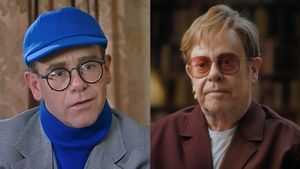



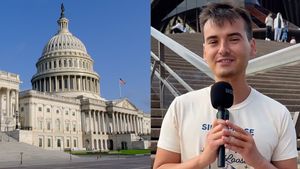


 Jeffrey Wright in The Last of Us.Courtesy HBO
Jeffrey Wright in The Last of Us.Courtesy HBO Ellie plays a moving song in The Last of Us.Courtesy HBO
Ellie plays a moving song in The Last of Us.Courtesy HBO Ellie and Dina run from danger in The Last of Us.Courtesy HBO
Ellie and Dina run from danger in The Last of Us.Courtesy HBO


